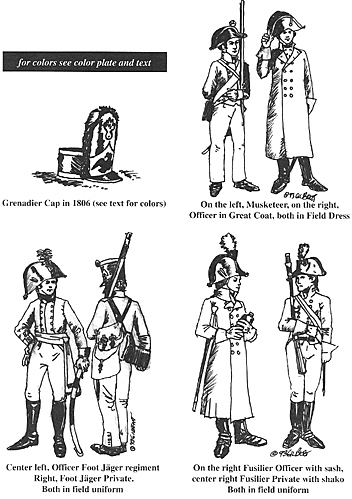 In 1806, the Foot Jager regiment was 12 companies
strong. In 1797, the tricorn was reintroduced in the Foot
Jager regiment and it was complemented by white and
green cords and a green plume. It was to be replaced by a
shako but due to the outbreak of war that change was not
implemented.
In 1806, the Foot Jager regiment was 12 companies
strong. In 1797, the tricorn was reintroduced in the Foot
Jager regiment and it was complemented by white and
green cords and a green plume. It was to be replaced by a
shako but due to the outbreak of war that change was not
implemented.
Note/Correction to Illustration: The Jagers and Fusiliers officers were wrongly identified. The Jagers officer and private are on the right of the picture and not on the left. The Fusilier officer and private are on the left of the picture.
The green coat had a red collar and cuffs, yellow wool shoulder stripes, and green turnbacks.
The belts were black and the saber belt was worn over the jacket and the black cartridge box was worn around the waist. A brown calfskin sidesack held by a black belt over the shoulder and a green linen breadbag fixed on a leather strap completed the equipment, along with a canteen. White breeches and black boots were worn.
Officers wore a green coat with a red collar. Their tricorn had a gold cockade and a white over black plume.
ENDNOTES
[1] See EE&L 2, pp
9-13 and 42-52.
Prussian Uniforms of the 1806 Campaign Part I: The Line Infantry
[2] See EE&L 2,
pp. 9-13 and 42-52, Bressonet's conclusion of his Etudes
tactiques sur la campagne de 1806, was translated in EE&L 2.
[3] Each guard
battalion was divided into 6 companies.
[4] The
Musketeer battalion included 5 companies from 1799. A new
decree of July 5, 1806 outlined the reorganization of the infantry
regiments at 3 battalions of 4 companies each, plus 2 companies
of Grenadiers but that reorganization could not be carried out
before the Campaign of 1806.
[5] Each company
had 2 buglers and I drummer.
[6] The Schutzens
were armed with rifles.
[7] The Jager
regiment was divided among 4 armies. One company, together
with 2 Fusilier battalions constituted the light infantry of the
advance guard Division commanded by Prince Louis Ferdinand,
which was attacked on October 10, by a Division of Lannes' Vth
Corps at Saalfeld.
[8] Regiments
with white facings painted the back of their plate light blue.
[9] The
ammunition pouch was decorated with a large badge on the center
of the flap and the design varied in size and design from regiment
to regiment.
[10] There were
exceptions. The Grenadier Guard battalion and the Duke of
Brunswick regiment wore pale strawcolored breeches.
[11] Like the
Musketeer regiments, the Grenadier battalions were named after
their commanding officers. Since most Grenadier battalions were
drawn from two regiments they were identified by a double
number (the exceptions are noted in the table):
NO. 1/13 PRINZ AUGUST 12/34 HUELSEN 33/47
SACK NO. 2/11 SCHLIEFFEN 14/16 FABECKY 37/57
SCHACK - VON PRUSSEN 17/51 SCHMELING 38/49
LOSTHIN NO. 3/21 ALT-BRAUN 18/27 RABIEL 39
KOLLIN NO. 4/54 VIERREGG 19/25 KNEBEL 40/43
GRAF DOHNA NO. 5/20 HANSTEIN 22/36 OSTEN 45
HERWARTH NO. 7/30 SCHLIEFFEN 23/26 REINBADEN 48/59
KRAFFT NO. 8/42 MASSOW 24/35 GAUDI 52/58
BRAUCHITSCH NO. 9/44 HALLMANN 28/50 BORCK 53/55
CRETY NO.10/41 BORSTELL 29/32 HAHN - - NO. 12/34 HUELSEN 31/46 JUNG-BRAUN -
-
Back to Empire, Eagles, & Lions Table of Contents Vol. 2 No. 4
Back to EEL List of Issues
Back to MagWeb Master Magazine List
© Copyright 1994 by Emperor's Headquarters
This article appears in MagWeb (Magazine Web) on the Internet World Wide Web.
Other articles from military history and related magazines are available at http://www.magweb.com
